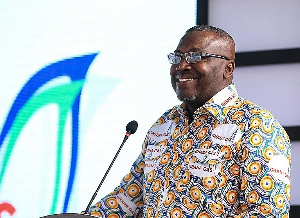 Ben K.D. Asante, Chief Executive Officer of the Ghana Gas Company
Ben K.D. Asante, Chief Executive Officer of the Ghana Gas Company
With the rally towards more renewable sources of energy in full force, gas remains the best bet as a source of clean fuel for economies owing to its availability, sustainability and readiness of infrastructure to process it, Chief Executive Officer of the Ghana Gas Company, Dr. Ben K.D. Asante, has said.
For him, the transition period to full carbon neutrality will extend beyond the projections of 2050, particularly in parts of the world where technology is lagging.
He, therefore, called for circumspection when speaking about the transition, adding that fossil fuel would be used for longer periods than projected, whilst describing it as the ‘best bet’ in the interim, from an availability, cost and environmental point of view.
“I don’t think that the transition period is going to end in 2040 or 2050, I think it’s going to be longer. I think fossil fuels would stick with us longer than some of the other countries are projecting but as we transition, gas will trump oil, gas is the best bet,” he said at the 10th edition of the Ghana Economic Forum (GEF 2021), to discuss, “The Petroleum Sector – the role of sustainable fuel supply for a reliable power sector”.
Justifying his position, Dr. Asante cited the Takoradi enclaving, where thermal generation is in the region of 1,000 megawatts – as an example.
He explained that the production of the approximately 1,000 megawatts cost an average $33.6 million monthly versus $70.1 million from crude oil; adding that the carbon dioxide (CO2) emission for gas is about six times lower than crude at 1.3 million tonnes per annum as opposed to 7.5 million tonnes.
On his part, Chief Executive at the Association of Oil Marketing Companies, Kwaku Duah, pledged the support of his outfit in ensuring that the nation has the right energy mix and steadily moves towards cleaner sources of fuel.
Managing Director at the West African Gas Pipeline Company (WAPCo) described the transition as a ‘win-win’ and predicted more cross-border collaborations to driver cleaner fuel, led by gas.
“We keep seeing across the globe, and it has been pointed out, the value of gas as a cleaner alternative as we transition. We are seeing a lot of drive to use that to create a win-win situation for all stakeholders. We are hopeful of seeing more collaborations going forward,” he said.
Lively debate
Much has been made about the certainty of fossil fuel being phased out in its entirety, with some of the biggest stakeholders in the industry suggesting that this should occur within the next two decades, that is, by 2040, whilst others say that the peak demand for fossil fuel has already occurred.
This has, in no small part, been encouraged by the increasing shift in stance towards more renewable sources of energy by key nations such as China and Russia.
This however is in contrast to other developments, as the ‘dirtiest fuel’ coal is estimated to be used in as much as 30 percent of the electricity supply in the United States. This is in addition to evidence that the fast-growing economies of South and Southeast Asia are building new coal-fired power plants.